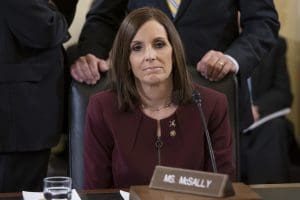GOP senator says she needs help with 'muddying up the landscape' on her record
Arizona Sen. Martha McSally previously voted to take away health care from people with preexisting conditions.

Sen. Martha McSally (R-AZ) does not have enough campaign funds to mislead Arizonans about her health care voting record, so she wants outside groups to do it for her, the Arizona Mirror reported on Friday.
In a recording from December obtained by the Mirror, McSally told a group of Republicans that her campaign doesn’t have “the resources to fight” the attacks on her heath care record. “If I went up on TV right now, my campaign coffers would be empty,” she said. “If we’re going to fight back with a TV ad, it’s going to cost us millions of dollars.”
That’s when she reportedly turned to outside groups for help.
“We need conservative outside groups, you know, to wake up, and get involved, and start muddying up the landscape a little bit,” McSally said.
McSally was concerned about attacks on her position regarding health care for people with preexisting conditions, according to the Mirror. Several ads have cited McSally’s vote in favor of a Trump administration rule making it easier for health insurance companies to sell “junk” health insurance products that do not cover people with preexisting conditions.
“Look, the attack ads are a lie,” McSally told the Republican group in December.
According to the Kaiser Family Foundation (KFF), consumers who try to purchase the type of insurance McSally voted in favor of “generally will be turned down if they have pre-existing health conditions.” Further, an insurer “might also refuse to cover a condition that existed, even if not-yet diagnosed, before you bought the policy,” KFF warns.
Beyond the most recent vote, when McSally was a House member, she enthusiastically voted to repeal the Affordable Care Act (ACA), which guarantees protections for people with preexisting conditions. Before that vote, McSally rallied her Republican colleagues, saying, “Let’s get this fucking thing done!”
According to an April 2019 analysis by Politifact, every single Republican health care proposal in the Trump era has “failed to match the guarantees [for people with preexisting conditions] currently in the Affordable Care Act.”
Before asking for help, McSally acknowledged that under federal law she is not allowed to ask for outside campaign assistance.
“There’s outside groups,” She said. “We can’t talk to them. We can’t invite them, but we pray for them every day.”
Ethics experts told the Mirror that McSally’s comments may be legally problematic.
“If an outside group hears that suggestion and and acts on it to buy ads to support Senator McSally, then the campaign finance laws would seemingly have been broken,” Paul S. Ryan, vice president of policy and litigation at Common Cause, a government watchdog group, told the Mirror.
In 2019, the McSally campaign was forced to pay tens of thousands of dollars in fines for breaking different campaign finance laws.
McSally is gearing up for one of the most closely watched Senate campaigns in the country. Her likely opponent, former astronaut Mark Kelly, repeatedly raised more campaign cash than McSally, and even overtook her in the polls.
McSally lost the 2018 Senate race in Arizona to Democrat Kyrsten Sinema, only serving now after being appointed by the state’s Republican governor. Health care was a major issue in the 2018 election as well.
“Arizonans know that Martha McSally can’t be trusted on health care issues, and no amount of spending from corporate interest-funded donors and outside groups can erase McSally’s long record of voting to increase health care costs and strip away coverage protections for Arizonans who have a preexisting condition,” Brad Bainum, spokesperson for the Arizona Democratic Party, told the Mirror.
The McSally campaign did not immediately respond to a request for comment on the matter.
Published with permission of The American Independent Foundation.
Recommended

Ohio doctors fear effects of emergency abortion care case set to go before U.S. Supreme Court
A federal law that allows emergency departments to treat patients without regard to their ability to pay will be under U.S. Supreme Court scrutiny this week, and Ohio doctors are concerned about the case’s local impact on emergency abortion care.
By Susan Tebben, Ohio Capital Journal - April 23, 2024
House GOP votes to end flu, whooping cough vaccine rules for foster and adoptive families
A bill to eliminate flu and whooping cough vaccine requirements for adoptive and foster families caring for babies and medically fragile kids is heading to the governor’s desk.
By Anita Wadhwani, Tennessee Lookout - March 26, 2024
U.S. House Speaker Johnson says IVF should be protected — just not by Congress
U.S. House Speaker Mike Johnson said Thursday that it’s up to states and not Congress to preserve access to in vitro fertilization, weighing in on a growing national debate and campaign issue.
By Jennifer Shutt, States Newsroom - March 14, 2024








































































